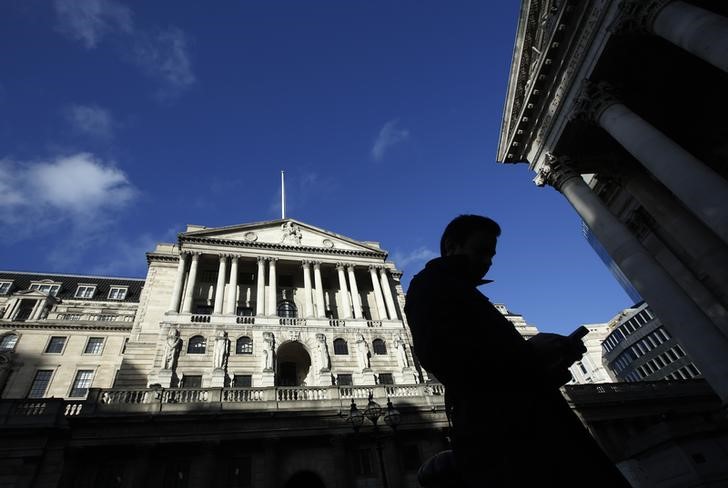Investing.com – Market participants looked ahead to the Bank of England’s (BoE) policy decision after a slew of economic data showed the British economy holding up better-than-forecast with the monetary authority largely expected to stand pat on interest rates on Wednesday while maintaining a dovish bias.
The BoE will release its rate decision and minutes of its Monetary Policy Committee (MPC) meeting at 11:00GMT (7:00AM ET) on Thursday.
A Reuters poll of economists published earlier this month predicted that the British central bank will wait until its November meeting before slicing 15 basis points from its benchmark interest rate.
Most market analysts expect the BoE to stand pat on policy after a slew of recent robust data saw fears of a recession in the near-term abate.
During the week, inflation in the U.K. eased in August, pulling even further back from the BoE’s 2% target, according to data released on Tuesday.
Data on Wednesday showed that the unemployment rate also remained at 4.9% with the employment rate at a record high as the British economy remained resilient despite worries over the impact of the U.K.’s June 23 decision to leave the European Union (EU).
However, some observers pointed out that the August inflation data should serve as no surprise to the Monetary Policy Committee (MPC), while others warned that the July data on employment included May and June, prior to the referendum, and hence ran the risk of worsening.
Still, the fact that the U.K. has yet to trigger Article 50 which would jump-start negotiations with the EU to reach new trade agreements continues to serve as a source of uncertainty for the British central bank.
The BoE already cut interest rates in August for the first time since 2009 and launched fresh easing measures in a bid to buffer the economy from a downturn following the Brexit vote.
“By over-delivering in August the Bank of England can now take a breather,” Bank of America Merrill Lynch (BofAML) wrote in a note to clients.
Unlike the Reuters survey that forecasts more easing in November, BofAML does not expect a move to arrive until February 2017.
Their view is that British economic growth is running above post-Brexit expectations for stagnation and that the U.K. finance minister Philip Hammond is expected to launch fiscal measures on November 23.
“The BoE will likely need to see that policy announcement first before considering its next move,” these analysts said.
However, other experts note that BoE governor Mark Carney has insisted on various occasions that all of the easing measures taken last August could be increased.
Strategists at XM noted that, “while recession fears have receded, further easing is likely this year as the outlook hasn’t changed significantly despite the rebound in the August PMI readings.”
“The BoE is therefore expected to maintain an easing bias while it keeps policy unchanged this month,” they concluded.
While waiting for the announcement, GBP/USD fell 0.16% to 1.3216, EUR/GBP slipped 0.01% to 0.8499, while GBP/JPY dropped 0.19% to 135.32.
Meanwhile, European stock markets traded flat with mixed signs. London’s FTSE 100 edged forward 0.05%, the Euro Stoxx 50 gave up 0.18%, France's CAC 40 lost 0.20%, while Germany's DAX slipped 0.05%.
